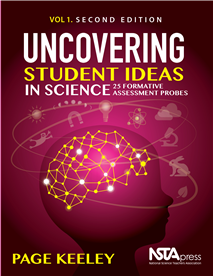Find Out What Your Students Really Think and Have Inside Their Heads
By Carole Hayward
Posted on 2018-05-31
Uncovering Student Ideas in Science: 25 Formative Assessment Probes, Volume 1, Second Edition by Page Keeley offers a variety of formative assessment probes that will help teachers gain insight into students’ thinking on 60 core science concepts.
 Like the first edition of volume 1, this book helps pinpoint what your students know (or think they know) so you can monitor their learning and adjust your teaching accordingly. The probes are now aligned to A Framework for K-12 Science Education and the Next Generation Science Standards. All probes include detailed instructions about how to administer them and suggested questions to ask to engage students in the issues the results raise. Also, each probe in the book includes extensive resources that can help both teachers and students. The book includes lists of NSTA journal articles, books, and online resources that can be used to enrich classroom lessons. Spanish versions of all the formative assessment probes are included in this updated edition.
Like the first edition of volume 1, this book helps pinpoint what your students know (or think they know) so you can monitor their learning and adjust your teaching accordingly. The probes are now aligned to A Framework for K-12 Science Education and the Next Generation Science Standards. All probes include detailed instructions about how to administer them and suggested questions to ask to engage students in the issues the results raise. Also, each probe in the book includes extensive resources that can help both teachers and students. The book includes lists of NSTA journal articles, books, and online resources that can be used to enrich classroom lessons. Spanish versions of all the formative assessment probes are included in this updated edition.
“Formative assessment probes tell you what students really think and have inside their heads, rather than what students think the teacher wants to hear. They provide information about students’ ideas that typical questions and assessments do not reveal,” said Keeley.
Classroom assessments serve multiple purposes, including diagnosing, monitoring, providing feedback, evaluating, and measuring student learning. Using formative assessment probes can help teachers to identify and address students’ misunderstandings, whether this is background information students bring to the lesson or confusion that sets in along the way.
Each formative assessment probe in the book is a two-tiered question. The first tier consists of a prompt and answer choices that include distracters and a “best answer” choice. “Since the answer choices are designed to mirror the research on commonly held ideas, it is highly likely that students will select one that is similar to their thinking,” said Keeley.
The second tier is the explanation. Students have to explain their thinking in support of their answer choice. Through these explanations, teachers can gain insight into student thinking.
“Formative assessment probes enable teachers to probe for and quickly and efficiently examine a multitude of ideas their students hold, including misconceptions and partially correct ideas. Many educators and researchers prefer to collectively call these ideas alternative conceptions—meaning that students’ ideas are not always completely wrong, even though they may differ from those of a scientist,” said Keeley. “The probes also uncover critical-thinking and reasoning strategies students use to support their ideas. These strategies can be based on intuition, logic, everyday experiences, or application of scientific knowledge.”
The book features formative assessment probes addressing scientific areas such as light, sound, matter, gravity, heat, temperature, Earth, space, and life. Check out the free sample chapter.
This book is also available as an e-book.
The mission of NSTA is to promote excellence and innovation in science teaching and learning for all.
Follow NSTA
Disclaimer: The views expressed in this blog post are those of the author(s) and do not necessarily reflect the official position of the National Science Teaching Association (NSTA).

